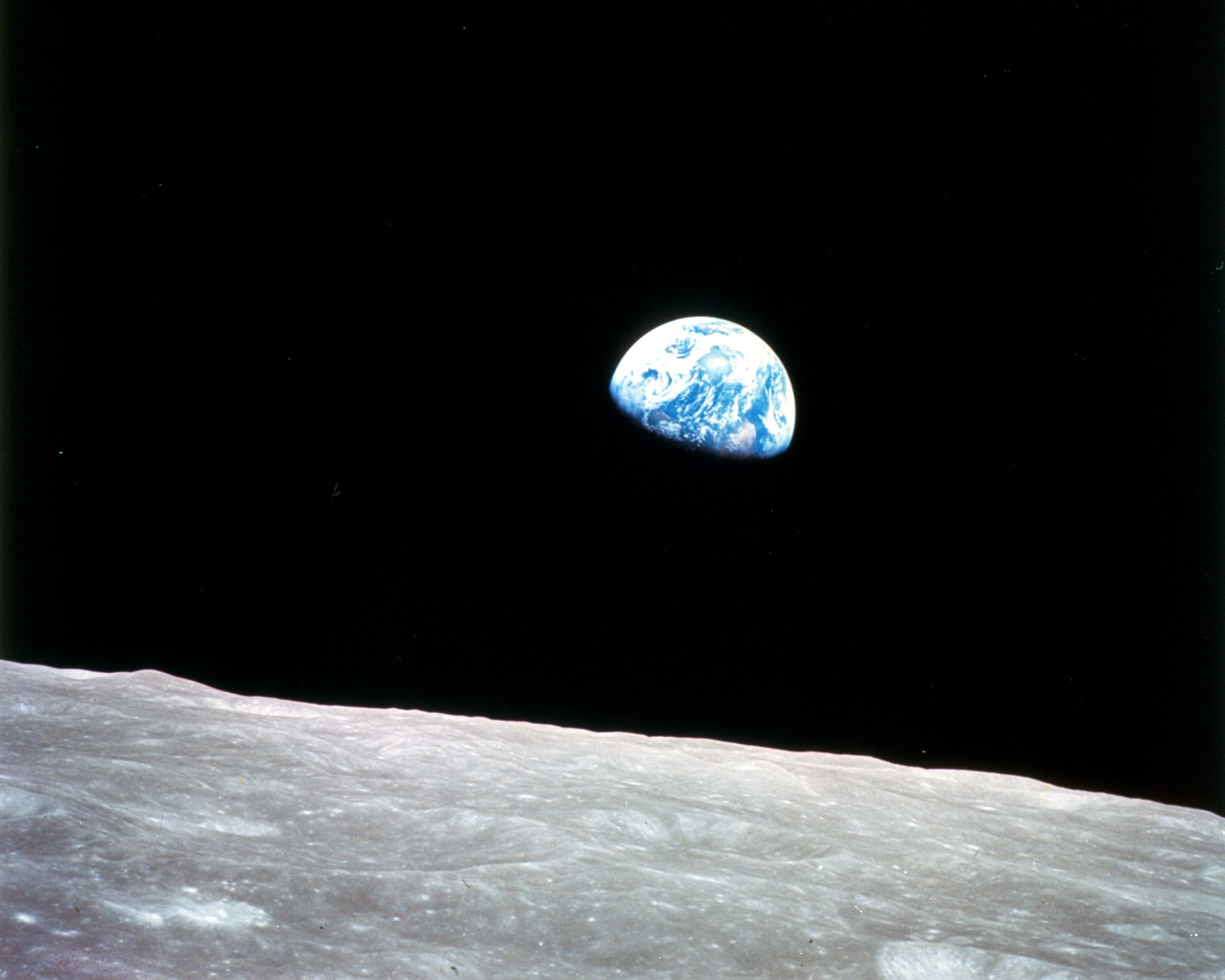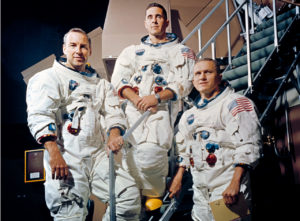
Earthrise
Photo William Anders, Apollo 8, December 24, 1968. Credit: NASA
This Christmas is the 50th anniversary of Apollo 8, the first mission to put men in orbit around the moon. Astronauts William Anders, Jim Lovell and Frank Borman began their flight December 21, 1968, and arrived in lunar orbit on Christmas Eve. They completed 10 orbits of the moon before beginning their return trip to Earth early on Christmas morning.
The Apollo 8 mission came at the end of a difficult and divisive year in the United States marked by the assassinations of Robert Kennedy and Martin Luther King, a dramatic worsening of the Vietnam War, and growing civil and student unrest throughout cities and campuses. In Europe, the Prague Spring had been crushed by Soviet tanks. For several days in May, student protesters and striking workers seemed capable of overthrowing the government of France. In Mexico, hundreds of students were killed before the Olympic Games in which American athletes raised their fists in protest of racism in the U.S..

Apollo 8 crew members (from left) James A. Lovell Jr., William A. Anders and Frank Borman. Photograph courtesy of NASA
Over a colorless lunar surface, Earth hangs suspended against a deep black background. The blue disc of the planet, half in shadow, is streaked with faint traces of white and brown. Earth’s atmosphere is too thin to be seen clearly in the photograph, a reminder of the fragility of our home amid the cold, deep lifeless expanse of space. “The vast loneliness is awe-inspiring, and it makes you realize just what you have back there on Earth,” said Lovell during the flight. “The Earth from here is a grand oasis in the big vastness of space.”
The borders of nations and divisions of continents also are not evident. For the first time in history, we saw our planet as a world that was “whole and round and beautiful and small,” as the poet Archibald MacLeish put it. “Looking back, it is possible to see that Earthrise marked the tipping point, the moment when the sense of the space age flipped from what it means for space to what it meant for Earth,” says Robert Poole in his book “Earthrise: How Man First Saw the Earth.”
Before returning to Earth, the crew of Apollo 8 held a live broadcast. As their command module floated seventy miles above the lunar surface, the three astronauts took turns reading the first 10 verses of the book of Genesis with Borman concluding with, “God called the dry land Earth; and the gathering together of the waters called the Seas: and God saw that it was good. And from the crew of Apollo 8, we close with good night, good luck, a Merry Christmas, and God bless all of you, all of you on the good Earth.”
“We were told that on Christmas Eve we would have the largest audience that had ever listened to a human voice,” Borman recalled in 2008. “And the only instructions that we got from NASA was to do something appropriate.” As many as one billion people watched the broadcast or listened on the radio.
Today, our country is arguably more divided than at any time since 1968. “Grievances abound. Policies swing back and forth from one political ideology to another, often with little attention paid to how they truly impact people’s lives,” notes Rich Harwood, president and founder, The Harwood Institute. “People protest; they rebel. Things break apart.”
Retreating into political factions and tribal enclaves, we have lost site of the vision of one nation under God much less of one world “whole and round and beautiful and small.”
Have we lost sight as well of the goodness of Earth, this remarkable, fragile, sanctuary that teems with life and possibility amid the cold, indifferent, expanse of space? Have we lost sight of the remarkable gift of life that is ours to enjoy, however fleetingly, amid the immeasurably vast expanse of time and space?
The Psalmist, who looked to the heavens, the moon and the stars, and wondered, “what are human beings that you are mindful of them,” reminds us that God made human beings “a little lower than God and crowned them with glory and honor.” (Psalms 8:4-5 NRSV)
This Christmas—amid so much division, hostility and anger—remember you, and your neighbor, have been crowned with glory and honor. Remember too, the good Earth we share and the blessing of life amid the vast expanse of time and space.
The views expressed are those of the author and not necessarily those of American Baptist Home Mission Societies.
Subscribe to Christian Citizen Weekly

